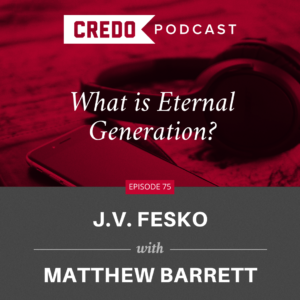Show Notes
 The principle without principle. Unbegotten. These are theological and philosophical titles applied to the first person of the Trinity. The biblical authors refer to him most commonly as the Father. The heavenly Father, however, is different from human fathers in many ways. He has never been a son, and he was a Father long before Genesis 1. So, we must ask, why did God reveal himself as Father and how does this affect our understanding of God the Son? J.V. Fesko and Matthew Barrett discuss the doctrine of eternal generation and define what it does and does not mean. Barrett and Fesko identify 9 Marks of an Unhealthy Generation that flirt with a variety of trinitarian heresies. They also celebrate the ways a biblical, orthodox doctrine of eternal generation can affect our salvation and the Christian life.
The principle without principle. Unbegotten. These are theological and philosophical titles applied to the first person of the Trinity. The biblical authors refer to him most commonly as the Father. The heavenly Father, however, is different from human fathers in many ways. He has never been a son, and he was a Father long before Genesis 1. So, we must ask, why did God reveal himself as Father and how does this affect our understanding of God the Son? J.V. Fesko and Matthew Barrett discuss the doctrine of eternal generation and define what it does and does not mean. Barrett and Fesko identify 9 Marks of an Unhealthy Generation that flirt with a variety of trinitarian heresies. They also celebrate the ways a biblical, orthodox doctrine of eternal generation can affect our salvation and the Christian life.
In this podcast J.V. Fesko and Matthew Barrett answer tough questions with a focus on chapter 6 of Barrett’s book, Simply Trinity: The Unmanipulated Father, Son, and Spirit (Baker, 2021).
Look for new conversations with notable theologians every week through Credo Magazine!
J. V. Fesko serves as professor of systematic and historical theology at RTS Jackson. Dr. Fesko has authored or edited more than twenty books including The Trinity and the Covenant of Redemption (Christian Focus) and The Covenant of Works: The Origins, Development, and Reception of the Doctrine (Oxford University Press).
Matthew Barrett is the author of Simply Trinity: The Unmanipulated Father, Son, and Holy Spirit (Baker). He is the founder and executive editor of Credo Magazine and host of the Credo podcast. He is associate professor of Christian theology at Midwestern Baptist Theological Seminary.
